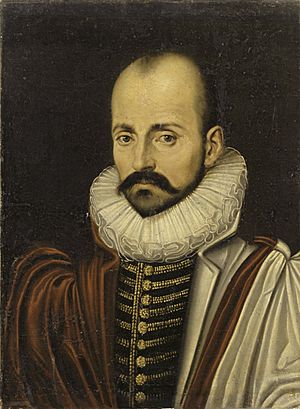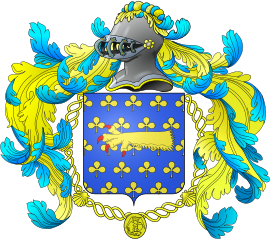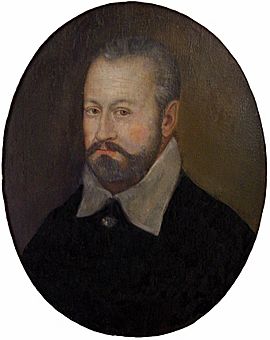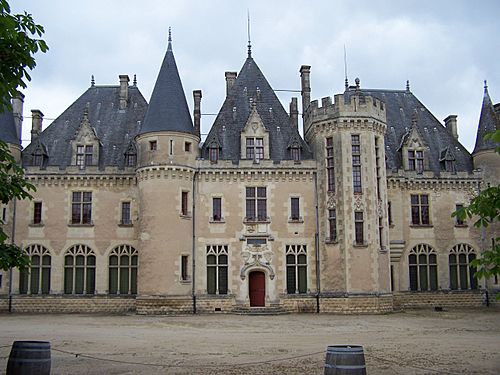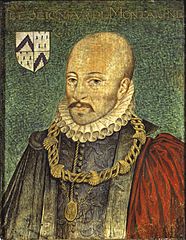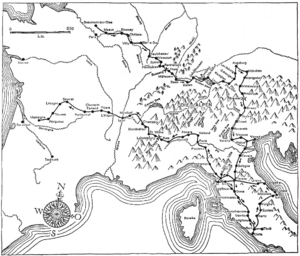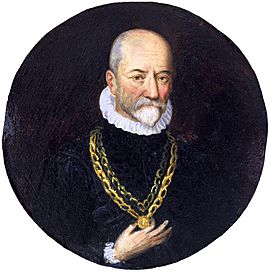Michel de Montaigne facts for kids
Michel Eyquem, Lord of Montaigne (born February 28, 1533 – died September 13, 1592) was an important French thinker during the French Renaissance. He is famous for making the Essay a popular type of writing. His works mix everyday stories and personal details with deep thoughts. Montaigne's book, Essais, contains some of the most influential essays ever written.
During his life, people admired Montaigne more as a government official than as a writer. His essays often included personal stories and thoughts, which some people at the time thought was not good writing. But over time, Montaigne became known for his free way of thinking and for questioning things. He is most famous for his skeptical question, ''Que sçay-je?" which means "What do I know?"
Contents
Michel de Montaigne's Life Story
Early Life and Learning
Michel de Montaigne was born in the Aquitaine region of France. His family lived on a large estate called Château de Montaigne, near Bordeaux. His family was very rich. His great-grandfather had earned a lot of money selling herring and bought the estate in 1477. Montaigne's father, Pierre Eyquem, was a French Catholic soldier and also served as the mayor of Bordeaux.
Montaigne's mother, Antoinette López de Villanueva, came from a wealthy family that had converted to Catholicism. His parents are mentioned in his essays, especially his father, with whom he had a close relationship.
Montaigne's education started when he was very young. His father had a special plan for him. For his first three years, Montaigne lived with a peasant family. His father wanted him to understand the lives of ordinary people. After that, he returned to the family castle.
His father wanted Latin to be Montaigne's first language. He hired a German tutor who only spoke Latin. All the servants and even his parents were told to speak only Latin to the boy. This helped Montaigne learn Latin very well. He also learned Greek through games and conversations, not just from books. This way of learning made him feel free and happy about his studies. Every morning, a musician would wake him up by playing an instrument.
Around 1539, Montaigne went to a well-known school in Bordeaux, the College of Guienne. He finished his studies there by age 13. After that, he studied law and began a career in the legal system.
Career and Family Life
Montaigne worked as a counselor in the legal system. In 1557, he became a counselor in the high court of Bordeaux. He also spent time at the court of King Charles IX. He received a high honor called the Order of Saint Michael.
While working in Bordeaux, he became very close friends with a poet named Étienne de La Boétie. Étienne's death in 1563 greatly affected Montaigne. Some believe that Montaigne started writing his Essais because he missed his friend and wanted a new way to share his thoughts.
Montaigne married Françoise de la Cassaigne in 1565. This was likely an arranged marriage. They had six daughters, but only one, Léonor, lived past infancy. Montaigne did not write much about his wife, but he did mention Léonor, saying she was never punished harshly.
Becoming a Writer
Montaigne's father asked him to translate a book by a monk named Raymond Sebond. Montaigne published this translation in 1568, a year after his father died. He also published the works of his friend, Étienne de La Boétie.
In 1570, Montaigne moved back to his family's estate, the Château de Montaigne, which he had inherited. He became the Lord of Montaigne. In 1571, he decided to step away from public life. He went to live in the Tower of the château, where he mostly stayed by himself. In his library, which held about 1,500 books, he began writing his famous Essais ("Essays"). These were first published in 1580.
Travels and Later Years
During the French Wars of Religion, Montaigne, who was Catholic, tried to bring peace between the different groups. Both the Catholic King Henry III and the Protestant Henry of Navarre respected him.
In 1578, Montaigne started having painful kidney stones. From 1580 to 1581, he traveled through France, Germany, Austria, Switzerland, and Italy, partly to find a cure. He kept a journal during his travels, noting different customs and personal experiences. This journal was published much later, in 1774.
During a visit to the Vatican, Montaigne's book, Essais, was reviewed. He apologized for some parts, and the book was returned to him.
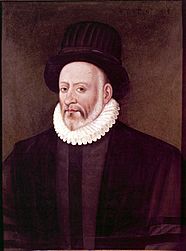
In 1581, while in Italy, Montaigne learned he had been elected mayor of Bordeaux, just like his father. He returned and served two terms as mayor, again working to create peace between Catholics and Protestants. The plague broke out in Bordeaux in 1585, causing him to leave his home for two years.
Montaigne kept working on his Essais, adding new parts and making changes. In 1588, he wrote the third book. He also met Marie de Gournay, a writer who admired his work. She later helped publish his essays. Montaigne called her his adopted daughter.
When King Henry III was killed in 1589, Montaigne supported Henry of Navarre, who later became King Henry IV. Montaigne wanted to end the fighting and bring peace to France.
His Death
Montaigne died in 1592 at the age of 59 at the Château de Montaigne. He suffered from a throat infection that made it hard for him to speak. He had once said that conversation was the most enjoyable thing in life. He asked for Mass to be held and died during the service.
He was buried nearby, and later his remains were moved to a church in Bordeaux.
Montaigne's Essays
Montaigne's most famous work is his Essais (Essays). This is a collection of many short writings on different topics, published in 1580. He was inspired by ancient Greek and Roman writers. Montaigne's main goal was to describe people, and especially himself, very honestly.
He observed that human nature is very varied and changes a lot. He wrote about his own poor memory, his ability to solve problems calmly, and how he didn't care much about becoming famous. He also wrote about his dislike for the religious conflicts of his time. He believed that humans cannot know anything for sure. The longest of his essays, Apology for Raymond Sebond, includes his famous question, "What do I know?"
Montaigne thought marriage was important for raising children. However, he didn't like strong romantic feelings, as he felt they could limit a person's freedom. In education, he preferred learning through real-life examples and experiences rather than just memorizing facts from books. His essay "On the Education of Children" shares these ideas.
The Essais had a big impact on both French and English writing. Francis Bacon's Essays, published later, were likely influenced by Montaigne's collection.
Montaigne's Impact on Psychology
Even though Montaigne was not a scientist, he made many observations about how people think and feel. In his essays, he wrote about topics like thought, motivation, fear, happiness, child education, and experience. His ideas have influenced the field of psychology.
Ideas on Child Education
Montaigne wrote a lot about how children should be educated. His essays On the Education of Children, On Pedantry, and On Experience explain his views. Some of his ideas are still used today.
Montaigne did not agree with the common teaching methods of his time. He thought that schools focused too much on reading old books and memorizing facts. He believed children should learn in many different ways. He also felt that information was presented as absolute truth, without allowing students to ask questions. This meant students couldn't truly learn. Montaigne believed that to truly learn, a student had to take information and make it their own.
He thought that choosing a good tutor was very important. The tutor should teach at the student's own speed. He believed tutors should talk with students, letting the student speak first. They should also encourage discussions and debates. This way, students would learn by themselves, realizing and correcting their own mistakes.
Montaigne believed in learning that was special for each student. He said that students combine what they already know with new information to form their own unique ideas. He also thought tutors should encourage students to be curious and ask questions. He felt that successful students were those who were allowed to question new information and study it for themselves, instead of just accepting what they were told. Montaigne believed a child's curiosity could be a great teaching tool if the child was allowed to explore what interested them.
Experience was also a key part of learning for Montaigne. Tutors needed to teach students through real experiences, not just by memorizing information from books. He argued that if students only learned from books, they would become adults who just obeyed without thinking for themselves. They wouldn't remember important things or learn useful skills. He believed that learning through experience was better than just reading books. So, he encouraged tutors to teach through practice, travel, and talking with others. He thought this would help students become active learners who truly understood things.
Montaigne's ideas about child education still influence us today. Many of his ideas, like individualized learning and the importance of experience, are part of modern education. He believed that the purpose of education was to help students live successful lives by being active and interacting with others.
Other Writers and Montaigne's Impact
Many thinkers explored ideas similar to Montaigne, such as Erasmus and Plutarch. Montaigne often quoted Plutarch in his Essays.
Some scholars believe Montaigne influenced William Shakespeare. Shakespeare likely read an English translation of Montaigne's Essais. A scene in Shakespeare's play The Tempest is very similar to Montaigne's essay "Of Cannibals".
Blaise Pascal's skeptical ideas in his book Pensées are often linked to his reading of Montaigne.
The English writer William Hazlitt greatly admired Montaigne. He said Montaigne was the first writer brave enough to say what he truly felt. Hazlitt tried to follow Montaigne's example in his own essays.
Ralph Waldo Emerson chose Montaigne as a subject for one of his lectures, calling him "the Skeptic." Emerson felt as if he had written Montaigne's book himself because it spoke so truly to his own thoughts. Friedrich Nietzsche said that Montaigne's writing truly made life on Earth more joyful.
The American philosopher Eric Hoffer also found Montaigne's style and ideas inspiring. He felt Montaigne was writing about his own innermost thoughts. Many other writers and thinkers have praised Montaigne for his honesty and deep insights into human nature.
Twentieth-century literary critic Erich Auerbach called Montaigne the first modern man. Auerbach wrote that Montaigne had the clearest idea of how humans could find their way in life without fixed rules.
Discovery of His Remains
On November 20, 2019, the Musée d'Aquitaine announced that human remains found in the museum's basement might belong to Montaigne. Investigations to confirm this began in September 2020.
Remembering Montaigne
Montaigne's birthday is now the basis for National Essay Day in the United States.
The humanities branch of the University of Bordeaux is named after him: Université Michel de Montaigne Bordeaux 3.
See also
 In Spanish: Michel de Montaigne para niños
In Spanish: Michel de Montaigne para niños
 | Charles R. Drew |
 | Benjamin Banneker |
 | Jane C. Wright |
 | Roger Arliner Young |


